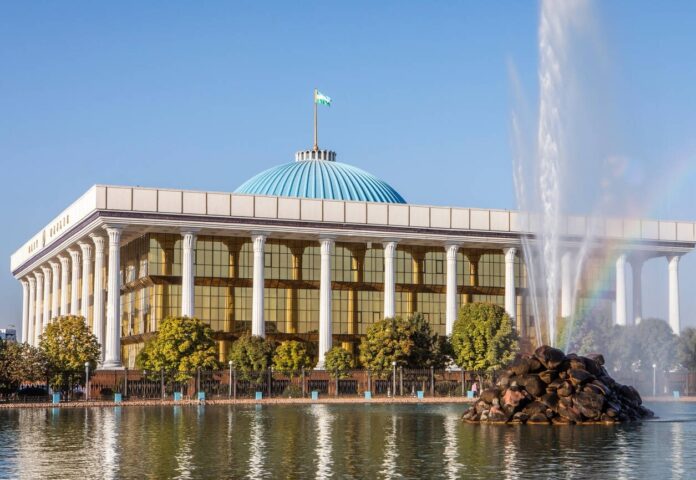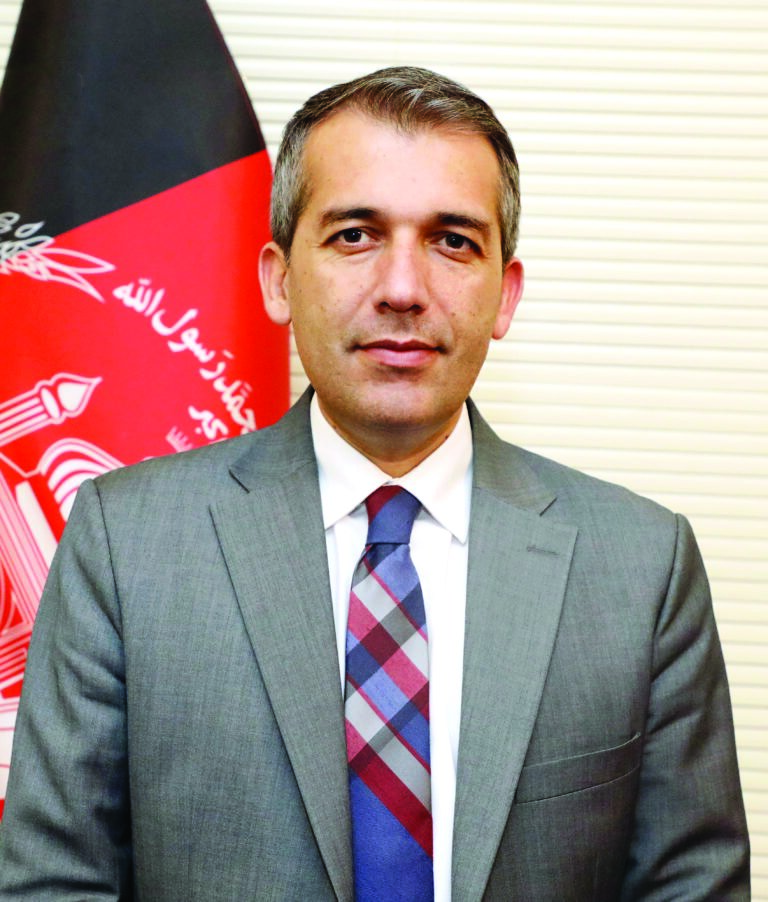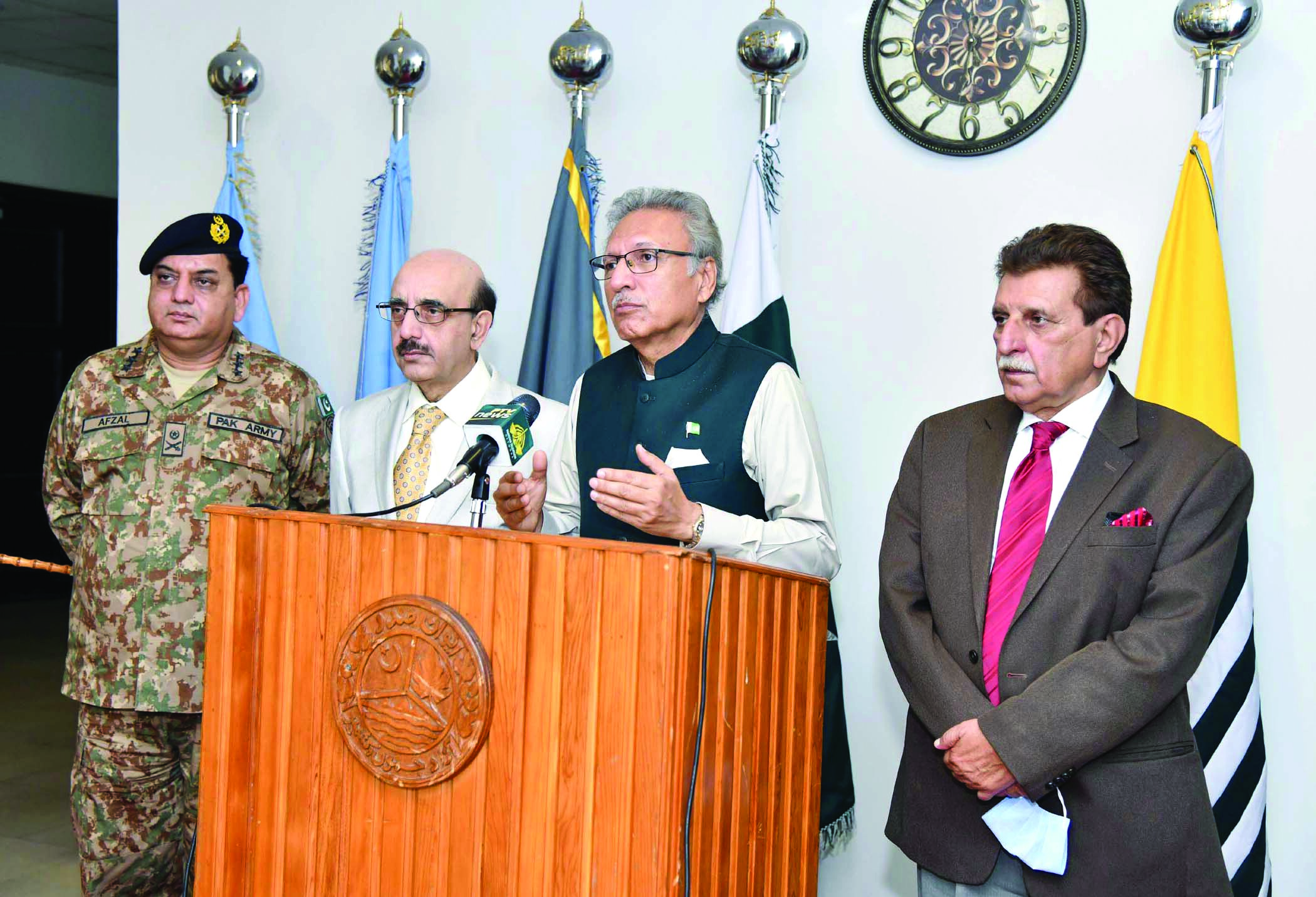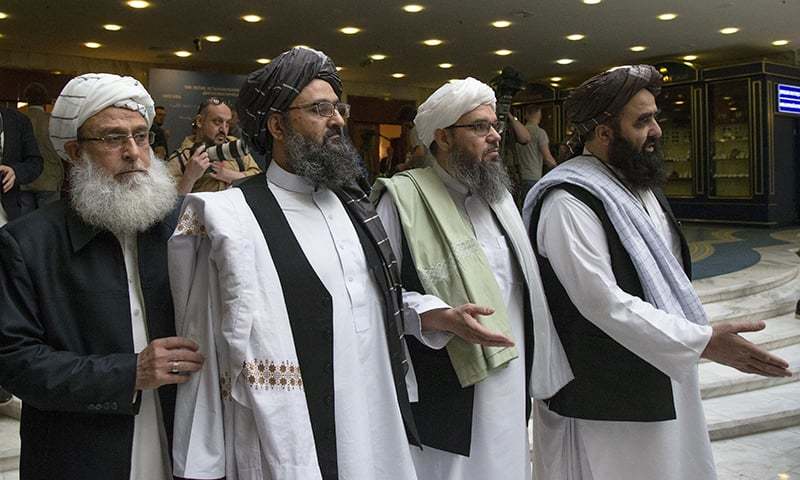Elections, political system and democracy are the modern trinity of human survival, human rights, freedom of expression, socio-economic prosperity, national production and people’s prosperity. It is the easiest and smoothest way for power sharing and gross-root participation. It provides political stability and economic sustainability and stands for political wisdom and hope for betterment. It transforms political parties, society, civility, economics, administration and state craftsmanship.
It is the ideal combination of divergences and convergences in any civilized country in the world. From classical Athens walled democracy to modern people free choice exercise, elections have remained part and parcel of the strategic way forward. All the parties in the Republic of Uzbekistan have already started their political pre-election campaigns in the country in order to actively participate in the upcoming elections 2014.
According to Central Election Commission (CEC) of Uzbekistan the elections to the Legislative Chamber of the Oliy Majlis of the Republic of Uzbekistan and Jokarghy Kenes of the Republic of Karakalpakstan, to the representative bodies of state authority in regions, districts, cities and towns shall be held on December 21, 2014. The elections shall be held on the basis of the general, equal and direct suffrage by secret ballot. Voter age is eighteen years.
Members of the Senate of the Oliy Majlis of the Republic of Uzbekistan shall be elected by secret ballot at relevant joint sittings of deputies of Jokarghy Kenes of the Republic of Karakalpakstan, the representative bodies of state authority in regions, districts, cities and towns from among these deputies not later a monthly term after their election.
In accordance with the second part of Article 117 of the Constitution of the Republic of Uzbekistan and Article 1 of the Constitutional Law of the Republic of Uzbekistan “On regular elections to representative bodies of state authority and the President of the Republic of Uzbekistan” elections to the Legislative Chamber of the Oliy Majlis of the Republic of Uzbekistan, the representative bodies of state authority of regional, districts, cities will be held on the first Sunday of the third decade of December 21 December 2014.
Political Parties Preparedness
The Republic of Uzbekistan has many political parties but major parties are given below:
| Names of the Political Parties | Representatives |
| Uzbekistan People’s Democratic Party (O’zbekiston Xalq Demokratik Partiyasi) | It has 27 members the Legislative Chamber |
| Justice Social Democratic Party (Adolat Sotsial Demokratik Partiyasi) | It has 10 members at the Legislative Chamber |
| National Revival Democratic Party (Milliy Tiklanish Demokratik Partiyasi) | It has 29 members at the Legislative Chamber, after unification with Fido Akorlar National Democratic party in June 2008 |
| The Movement of Entrepreneurs and Businessmen- Liberal-Democratic Party (O’zbekiston Liberal Demokratik Partiyasi) | It has 39 representatives as deputies of the Legislative Chamber of the Oliy Majlis |
Role of Political Parties
In Uzbekistan the political parties’ role in the electoral process serve as basis for the adoption of the Law of the Republic of Uzbekistan “On the Introduction of Amendments and Addenda to Some Legislative Acts of the Republic of Uzbekistan Due to the Improvement of Legislation on Elections” in 2008.
Uzbekistan’s People’s Democratic Party has submitted necessary documents to the Central Election Commission (CEC) of the country to participate in the parliamentary elections 2014. So far, all the political parties of the country, People’s Democratic Party, Social Democratic Party Adolat, Democratic Party of Uzbekistan Milly Tiklanish and the Movement of Entrepreneurs and Businessmen- Liberal-Democratic Party have submitted relevant documents to the CEC.
Participation & Stipulated Procedures
(a) Application for Participation: The political parties should submit an application for participation in the election.
(b) Submission of a Certificate: The political parties should submit a certificate from the Ministry of Justice proving that the party has been registered within the statutory period, as well as their subscription lists. All the required documents should be submitted before October 12.
(c) Gathering of Signatures: Each party is required to gather at least 40,000 signatures of voters supporting its participation in the election. However, the number of signatures, gathered in one administrative-territorial unit of the country should not exceed eight percent of the required volume.
(d) CEC Final Decision: On the basis of the submitted documents, the CEC will make a final decision on approving the party’s participation in the election. The nomination of MP candidates will start on October 17.
Bicameral Parliament
The Republic of Uzbekistan has multiparty political system in the country which has bicameral parliament. It upholds the novel concepts of accountability, transparency and separation of power. It streamlines the functionalities of both the houses. It works for the betterment of common people by initiating different crucial amendments. It protects the basic rights of the people at large.
According to the Central Election Commission (CEC) Uzbekistan population stands at 31 million people and over 20 million of them are eligible voters.
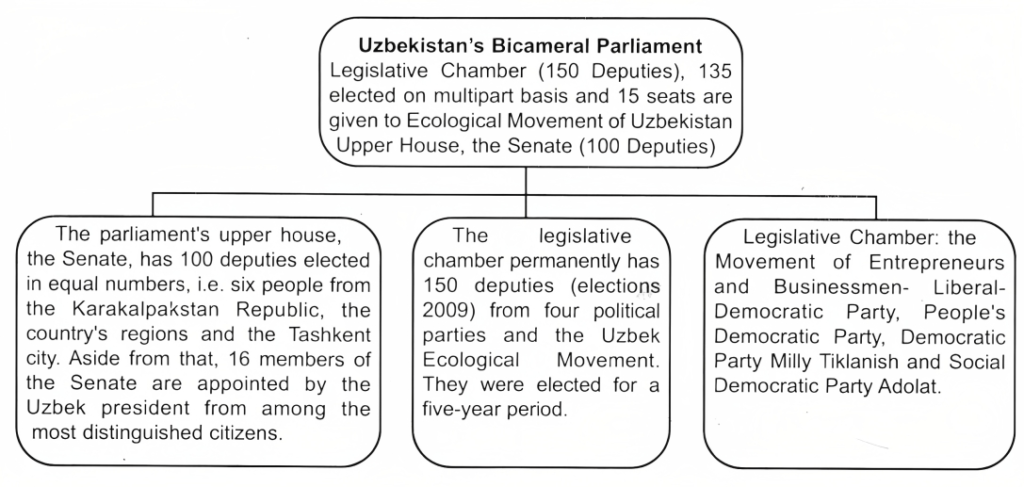
Strategic Imputes
According to fair assessment a great significance is attached in Uzbekistan to the conduct of forthcoming parliamentary elections at a high level in accordance with international norms and principles, for their results are to define the strategy and path of development of the nation for the next 5 years.
Uzbekistan’s parliamentary elections 2014 are a strategic way forward. Elections are going to be held amid the enhancement of powers of the parliament and further deepening of democratization of electoral system. It would be first giant sept towards further strengthening of democratization and politicization in the country. H.E Islam Karimov, the President of Uzbekistan initiated “The Concept of Further Deeping of Democratic Reforms and Establishing Civil Society in the Country” in November 2010. Afterwards, many constitutional amendments were introduced in 2011, 2012 and 2014 to some articles of the Constitution of the Republic of Uzbekistan (Articles 32, 78, 80, 93, 96, 98, 103 and 117) and laws on elections, which serve as a legal basis for further democratization of the activities of legislative and executive branches of power, as well as the electoral system.
Operational Parts of Amendments
In accordance with the Law “On Central Election Commission of the Republic of Uzbekistan”, the Central Election Commission (CEC) has become an independent body tasked with practical implementation of democratic principles of the electoral system.
CEC independent Status & Operations
Now in Uzbekistan, the Central Election Commission (CEC) has been vested with a status of permanently operating and independent constitutional body. The mechanism of its activities has been re-defined which provides for the preparation and holding of elections without interference of any other government body, and principles of its activities have also been approved: that is, independence, legality, collegiality, publicity and fairness. It is hoped that a law is to be passed in the near future to envisage a substantial expansion of powers and the consolidation of financial independence of the CEC in the country.
Main Purpose
The adoption and implementation of the draft law about electoral legislation aimed at strengthening the financial independence of the Central Election Commission in the preparation and conduct of elections, will contribute to the full implementation of the principle of freedom of choice, further democratization of the sphere, strengthening the principles of openness and transparency.
Action Plan 2014
The CEC already approved an action plan to prepare and hold elections to the Oliy Majlis of the Republic of Uzbekistan, regional, district and municipal Kengashes (Councils) of people’s representatives in 2014. It includes a set of measures to ensure the legality, transparency, openness and publicity at all stages of the election campaign.
Salient Features
(a) Openness and Transparency all the way: All electoral commissions will be provided by way of holding their meetings with participation from political parties, mass media and observers. The participation of observers from international institutions and foreign states will also be envisioned along with the observers and authorized representatives of political parties.
(b) Creation of Extensive and Equal Opportunities: It also stipulates the creation of extensive and equal opportunities for political parties and candidates for deputies in utilizing the possibilities of mass media during the election campaign in order to inform the electorate and general public about their election programs, along with providing the voters with timely updates the voters about the progress of preparation and conducting of elections.
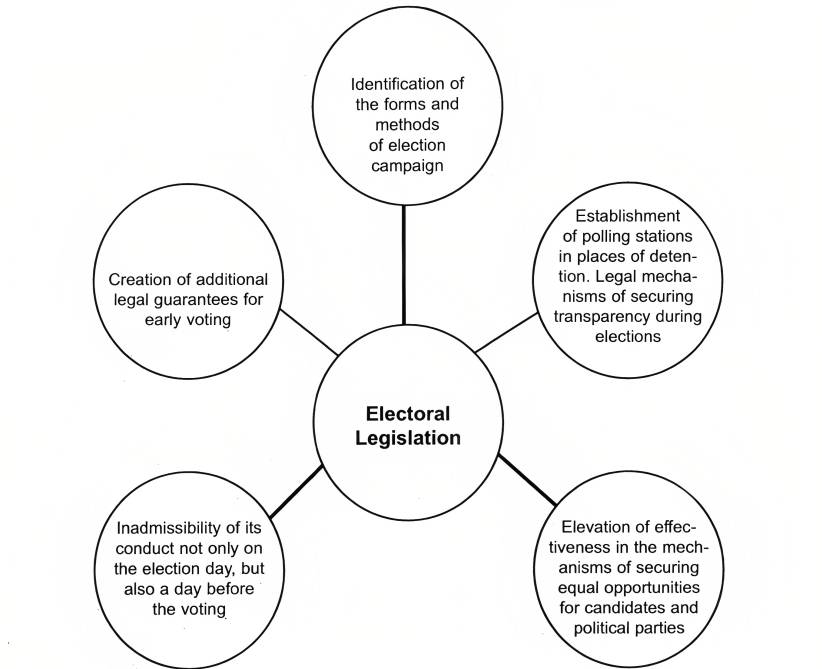
Constitution of Uzbekistan and the System of Electoral Legislation
The Constitution of the Republic of Uzbekistan is the foundation of the system of electoral legislation. Its Chapter 23 addresses the electoral system, as it contains a range of fundamental principles that guarantee an actual political pluralism.
The process of national electoral legislation’s evolution has been closely related with two principal phases of independent development of Uzbekistan’s nation. The main purpose of which has been to increase the effectiveness of legal mechanisms, reliable supply of electoral rights of citizens and their free will, introduction of new forms, methods and conditions for election campaigning.
| Different Phases of Electoral Legislation | Salient Features | Achievements |
| Phase-I (1991-2000) | Provided a basic legal foundation for the formation of electoral bodies and the national statehood. It ensured the formation of a fundamentally new democratic electoral system. “On Elections of President of the Republic of Uzbekistan” (November 1991), “On Referenda of the Republic of Uzbekistan” (November 1991), “On Elections to the Oliy Majlis of the Republic of Uzbekistan” (December 1993), “On Elections to Regional, District and Municipal Kengashes (Councils) of People’s Representatives” (May 1994), “On Guarantees of Electoral Rights of Citizens” (May 1994), etc. were also enacted or promulgated. | Consistent expansion of electoral rights of citizens and the elevation of the role of political parties in the formation of representative bodies of government. Creation of an integrated, independent system of electoral commissions from bottom to top from a precinct to the Central Election Commission. Ensuring openness, publicity and transparency of elections as well as equal rights of all candidates. |
| Phase II (2001-2014) | It has been closely linked to the active democratic renewal and modernization of the country. The nationwide referendum held in January 2002 a professional bicameral parliament was introduced. Integrated democratic reforms were introduced. “On the Outcomes of the Referendum and Main Principles of the Arrangement of Government”, amendments and addenda were introduced to the Constitution of the Republic of Uzbekistan. “On Elections to the Oliy Majlis of the Republic of Uzbekistan” was also promulgated. | It fixed the order of nominating candidates for the membership of the Legislative Chamber (the Lower House of Parliament) as well as the order for forming the Senate of Oliy Majlis of the Republic of Uzbekistan. Uplifting the role of political parties in parliament by forming effective legislative base, liberalization and democratization of the electoral system and legislation on elections. |
| Summary (Phase I & II) | Universally accepted norms in respecting human rights, freedoms and legitimate interests as well as fundamental principles of modern model of electoral systems has been reflected in current legislative acts and in practice; A new institution has been introduced into the electoral legislation namely, the assignment of quotas in deputy seats. Fifteen deputy seats in the Legislative Chamber are allocated to a public-social organization the Environmental Movement of Uzbekistan, to better address environmental issues. They present candidates for the membership of precinct electoral commissions to the relevant district election commissions during elections of President of the Republic of Uzbekistan as well as elections to the Legislative Chamber of Oliy Majlis, regional, district and municipal Kengashes of People’s Representatives. | Registration of electorate. A comprehensive state registration of voters has been put in place; The number of women should not be less than thirty percent of the total number of candidates nominated from political parties to the deputyship of representative bodies of government. A special role in the preparations and holding of elections is assigned to citizens’ self-governing bodies (mahalla) as a traditional democratic system of local self-government. In contrast to other institutions of civil society, the citizens’ self-governing bodies are entitled with such rights as to nominate candidates to deputyship in district and municipal Kengashes of People’s Representatives. |
Concluding Remarks
Wide ranging reforms have been in progress under the leadership of H.E. President Islam Karimov across all walks of life, including the electoral system. To ensure the implementation of fair and free election publicity is being ensured in the work of electoral commissions during the preparations for and conduct of elections.
The Republic of Uzbekistan has a multiparty system which creates a foundation for the enhancement of participation of political parties in the work of the parliament and other representative bodies of local government, and in making decisions important for the development of the country.
The Concept of Intensification of Democratic Reforms and Formation of Civil Society in the Country contributes as a beginning of a new stage in the perfection of nation building, legal-normative system and electoral legislation in Uzbekistan.
According to the Republic of Uzbekistan’s Funding Political Parties Act, a political party is entitled for government resources to fund its authorized activities in the case it has received a necessary quantity of deputy seats as a result of elections to the Legislative Chamber of the Oliy Majlis to form a fraction (parliamentary group) of a political party in the lower house.
Moreover, in line with laws on elections to the Oliy Majlis of the Republic of Uzbekistan and the elections to regional, district and municipal Kengashes of People’s Deputies, political parties have a right to nominate one observer each to take part in all events within the preparations for and conduct of elections as well as in the rooms for voting on the day of elections and during ballot count.
It is assessed that the forthcoming elections in Uzbekistan are to be held in favorable conditions and environment created in accordance with the principles of advanced democratic country and civil society. Thorough pre-election preparations have been undertaken throughout the country.
It is thoroughly studied that the adoption of the Law of the Republic of Uzbekistan on the Introduction of Amendments and Addenda to the Laws of the Republic of Uzbekistan on Elections to the Oliy Majlis of the Republic of Uzbekistan and Elections to Regional, District and Municipal Kengashes of People’s Deputies to Further Provide for a Freedom of Choice and the Evolution of the Electoral Legislation, has further enhanced the effectiveness of mechanisms in providing the candidates for deputies and political parties with equal conditions and opportunities for the election campaign. Furthermore, the legislative fixation of norms of free expression of will by citizens, of securing the openness of the activities of electoral commissions, of thwarting violations of the electoral law has cemented the guarantees of electoral rights to a greater extent.
It is noticed that the guarantees of citizen electoral rights envisaged in the national electoral legislation of Uzbekistan comply completely with the universal provisions of international law.
It multipart political system allows for the elevation of socio-political activity of citizens and their role in public and state administration because democracy is unimaginable without political parties. It promotes the spirits of pluralism which is one of the most critical and principal conditions of democracy.
Another notable observation is related to the uplifted role of women in the activities of political parties of Uzbekistan with the purpose of expanding their participation in nation building. Securing a 30-percent quota for women in Uzbekistan for the nomination of deputies from political parties facilitates growth in their socio-political activity shows the high pace of women empowerment and denial of gender discrimination.
In difficult times of umbrella revolution (Hong Kong), severe political chaos (Ukraine), political instability (Egypt), massive people processions (Pakistan, Tunisia) and weak political systems in most part of the Africa, Middle East and CIS, parliamentary elections 2014 of Uzbekistan would definitely pave the way for further deepening of politicization and democratization process in the country.


